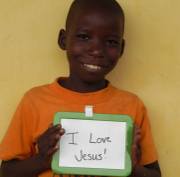
South Sudan (MNN) — In South Sudan, only 2% of children finish primary school, and only 6% of the teachers are actually trained, according to The Luol Deng Foundation.
Education took a major hit in South Sudan–a largely Christian and Animist nation–because of civil war with its northern, Muslim counterpart at the time.
It didn’t help that South Sudan’s educational system experienced forced Islamic and Arabic ideals in an attempt to kill off their native languages and cultures.
The civil war ended in January 2005, and while slightly improved since then, education in the country has still struggled to get back on its feet.
Instead of going to school, nearly 35% of kids in South Sudan are in child labor. Over 10% of South Sudanese children try to juggle both school and work as a child laborer.
Africa Inland Mission (AIM) sees the need both for education and for Christ in South Sudan. They currently have two short-term teachers, Kim Davey and Abbi Banham, stationed in the village of Nagishot in the southern area of the country.
Nagishot is home to the Didinga people. There are a total of two schools in the community: Faith Nursery and City on the Hill Primary.
Between the two schools, there are twelve classrooms.
Five teachers cover these twelve classrooms, and four of the teachers are from the West. Students just at the Kindergarten level range from ages 4 to 24.
AIM’s mission is to send out workers who will encourage and grow Christ-centered church body within communities. Providing an education to the Didinga community has given the teachers with AIM a unique platform to minister God’s love to the people as well.
Others interested in short-term missions in South Sudan with AIM minister for eight weeks. Giving a child an education motivated by the love of Christ can save them from a possible future in the child labor that is present in the country.
Pray for wisdom and perseverance for teachers already there as they spread the message of the Gospel along with encouraging education. Pray also for more trained teachers to become available in South Sudan.
